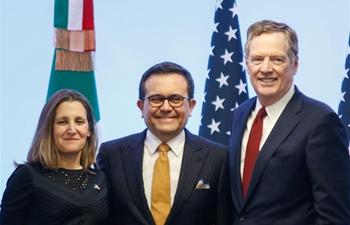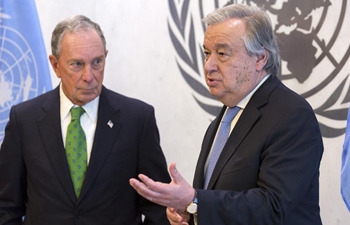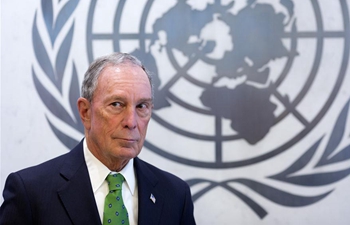by Edna Alcantara, Luis Rojas
MEXICO CITY, March 5 (Xinhua) -- A U.S. proposal to slap tariffs on steel and aluminum imports "is a bad sign" for ongoing efforts to renegotiate the North American Free Trade Agreement (NAFTA), a Mexican researcher said.
"I don't see a positive outlook for the successful renegotiation of NAFTA," following U.S. President Donald Trump's announced tariffs, said Ignacio Martinez, a professor on international relations at the National Autonomous University of Mexico (UNAM).
"On the contrary, President Trump's announcement ... is a bad sign for the negotiations," Martinez told Xinhua.
The steep tariffs, 25 percent on steel and 10 percent on aluminum, will apply to Mexico and Canada, the two U.S. partners in NAFTA, despite their objections, further undermining the trapartite trade deal.
"While the measure affects Canada more, because it is among the main exporters (of metals) to the U.S. market, it also impacts Mexico, and the fact that it was announced during the negotiation process adds tension to the talks," said Martinez.
Representatives from the three countries just finished the seventh round of talks on Monday in the Mexico City when Trump announced the measure on March 1.
One of Trump's main campaign pledges was to renegotiate the 1994 trade deal, which he claims unfairly benefits Mexico at the expense of U.S. industry and jobs, and the talks began in mid-August.
Of the 18 main trade topics on the agenda, consensus has "only been reached on seven. Consensus is being built, or negotiated, on another eight topics. But the most sensitive issues, there are around five, have not been discussed," said Martinez.
To further progress, the chief negotiators are to meet in Washington at the end of March, including Mexico's Economy Minister Ildefonso Guajardo, U.S. Trade Representative Robert Lighthizer, and Canada's Foreign Minister Chrystia Freeland.
Their meeting is designed to tackle the thornier issues, such as agriculture, anti-corruption measures, access to markets, rules of origin in the automotive industry and dispute resolution.
"I believe the serious negotiating is going to be centered on that, and I don't think these contentious issues are going to be cleared up until then," said Martinez.
While that meeting will be "key" to hammering out a preliminary agreement, it will still be "tough" to reach a definitive deal, he said.
However, a collapse of the two-decade trade pact would be "catastrophic", said Martinez, adding it would trigger direct trade wars, and the "immediate" loss of jobs -- as many as 970,000 in Mexico, 250,000 in the United States and 90,000 in Canada.
Mexico would bear the brunt of the fallout because "it needs NAFTA, it needs external factors to grow economically," said Martinez.
In the absence of a deal, and with the subsequent shrinking of the economy by "2.5 and 3.5 percent in the next three years, I think we would have a crash like we did in 2009," Martinez predicted.
According to the Mexican Institute for Industrial Development and Economic Growth (IDIC), without NAFTA, Mexico's GDP would contract from 1.5 percent to 2.5 percent, accompanied by rising inflation and a lack of policies designed to strengthen the domestic market.
Canada, the United States and Mexico have been carrying out intense negotiations to redraft NAFTA since August 2017 after U.S. President Donald Trump said the deal has been unfair to the United States.
The seventh round of talks to modernize NAFTA ended in the Mexico City on Monday on a mixed note with the U.S. calling the progress not good enough, with only six of NAFTA's 30 chapters having been closed so far.













